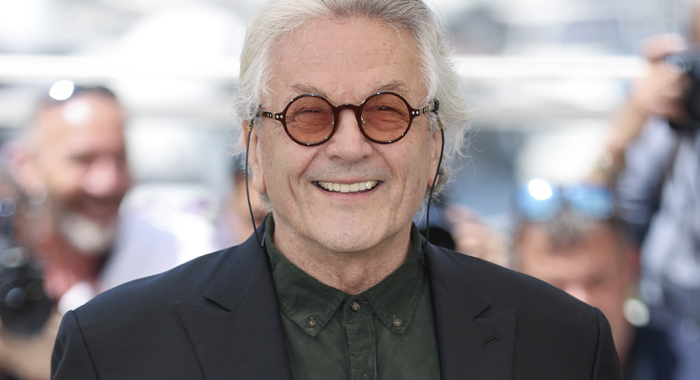George Miller's Five Favorite Films (original) (raw)
George Miller's Five Favorite Films
The Oscar-winning director of Mad Max: Fury Road and Three Thousand Years of Longing talks inspirations, storytelling, and magic.
TAGGED AS: interviews, movies

(Photo by Mike Marsland/Getty Images)
George Miller’s filmography is one of the most varied for a contemporary filmmaker. His films explore a wide variety of genres and tones, delighting audiences with family-friendly musical tales of dancing penguins in Happy Feet, introducing us to the apocalyptic wasteland of Mad Max, or presenting darkly comedic tales of witchery in The Witches of Eastwick.
Now, Miller is taking a break from the wasteland in between two Mad Max movies with Three Thousand Years of Longing. The movie follows Alithea (Tilda Swinton), a scholar on a trip to Istanbul who encounters a djinn (Idris Elba) who offers her three wishes in exchange for his freedom. Part of the magic of the film is how it feels epic in scope like a big-budget blockbuster but also as intimate as a Sundance indie drama. This is the kind of movie only a maximalist filmmaker like George Miller could make, reminding us of the power of stories to take us to faraway worlds.
Ahead of the film’s release. Miller spoke with Rotten Tomatoes about his Five Favorite Films, which are as eclectic as his own movies, and he even gave us an extra one. He also talks about making a movie that feels both intimate and fantastical, and the power of storytelling.
Rafael Motamayor for Rotten Tomatoes: You talk about these films having a lot of layers and transporting you to different worlds, and that seems to also apply to your movies, from Mad Max to Happy Feet to Three Thousand Years of Longing. Is that something that you look for in the projects you take?
George Miller: I think that’s a function of stories and why stories endure. If you think of the stories of your childhood or your own family stories that get told over and over again, they do have similar resonances. We all have family stories that are told over and over, some across generations. I think what’s happening there is that there’s enough beauty, conflict, meaning, learning, engagement, and enchantment in all those stories, whether they be personal stories or old, big epic religious narratives, or the big scientific narratives. Modern 20th century physics is probably one of the great narratives that humankind has. It’s powerful and mysterious, and it’s what’s allowing us to talk to each other right now in virtual real-time because of those stories.
I was once down by a beach near where we live and I see two families pass each other. They stopped and started talking about what they did the other night. One family says they went to the movies, but not one member of the family could remember the film they saw. And I remember thinking to myself “Someone’s gotta remember,” and I told myself “God forbid I make a film where not one member of the family remembers that they saw it.” So that really stuck with me and I hope with every film that I make that it has some of those resonances.
RT: This film feels so sprawling and epic, but also intimate and small at the same time. What lessons did you take from the films you’ve made across your career and apply to this film?
Miller: I think that’s what drew me to this film, because it was full of those paradoxes; it declares itself as a fairy tale, but it says it’s true. And the original author put it together in an anthology of fairy tales that she made and asked me why this story and not the others, and I said because it felt authentic. Then she said that’s because everything in the story is true except the djinn. She was the narratologist who went to Istanbul; she had that conference. She is really into stories as a scholar, and she thinks the most significant stories are Arabian Nights, all 1001 stories, but mainly in the way they evolved over centuries.
So the paradoxes were really interesting to me – a fairy story that resonates with truths. You have a creature of reason in Alithea and a creature of emotion and desire in the djinn. You have one that is mortal and one that can live indefinitely. The constant question in the story is what is real and what is not real. And ultimately, it talks about the big things, about love and death and what is love, how you know, and what are the gestures that made the love real. It’s not something you can wish for, because it’s only something that can be given. You can’t demand love. It has to be given to you freely, as the character says.
Three Thousand Years of Longing opens theaters on August 26, 2022.
Thumbnail images by: ©Walt Disney Pictures, ©Paramount Pictures, ©20th Century Fox Film Corp., Everett Collection, ©Columbia Pictures